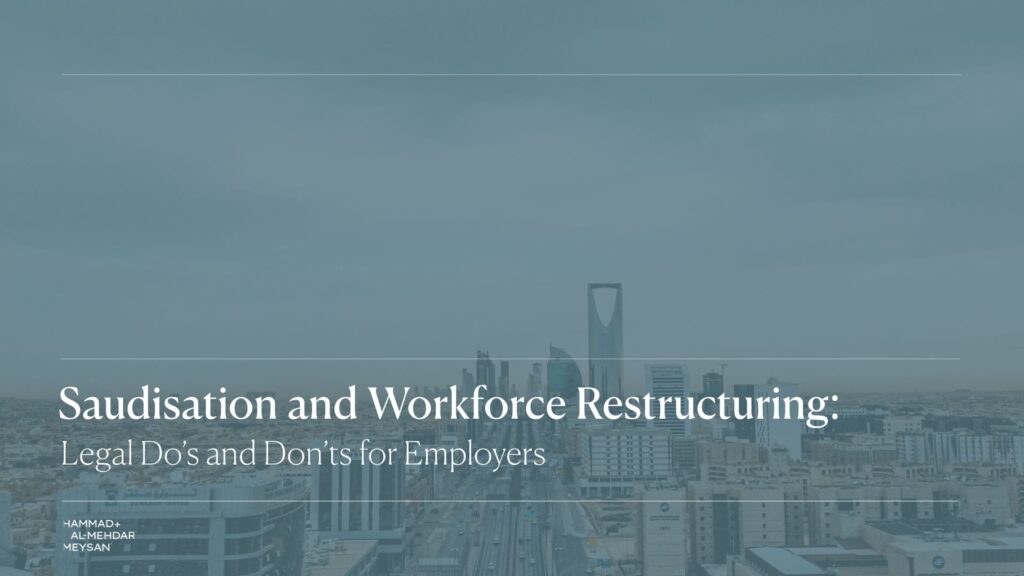
Saudisation, also known as the Saudi nationalisation programme, is a central component of the Kingdom’s economic and social policy. It requires private sector organisations to increase the representation of Saudi nationals within their workforces. At the same time, many employers must also manage workforce restructuring as business models evolve. The interaction between Saudisation requirements and restructuring exercises presents both opportunities and risks. Employers must understand their legal duties, avoid common pitfalls, and implement strategies that are compliant with Saudi labour law.
Saudisation and the Nitaqat System
The Saudisation programme is administered under the Nitaqat system, which categorises companies into tiers ranging from Platinum and High Green to Yellow and Red. The categorisation depends on the number of Saudi nationals employed in relation to the overall workforce size. Companies in higher categories enjoy significant benefits such as faster access to work visas and eligibility for government contracts. By contrast, companies in lower categories may face severe restrictions that hinder their ability to operate effectively.
Recent policy adjustments have increased Saudisation requirements in specific industries, with some sectors now requiring up to 80 per cent Saudi employment. Employers must therefore ensure that their hiring strategies are aligned with these enhanced quotas and must also take advantage of support initiatives such as the Human Resources Development Fund, which provides subsidies for the recruitment and training of Saudi employees. Attempts at superficial compliance, such as appointing Saudi nationals to nominal positions without genuine responsibilities, are prohibited and can attract penalties.
Workforce Restructuring and Termination Procedures
Workforce restructuring often requires difficult decisions, including contract terminations or non-renewals. Saudi labour law provides clear rules under Articles 74 to 76 that govern notice requirements. For fixed-term contracts, Article 74 requires prior written notice of at least 30 to 60 days if either party does not intend to renew the contract. Article 75 requires that indefinite contracts be terminated with at least 60 days’ notice where employees are paid monthly, or 30 days in other cases. Article 76 makes it clear that failure to comply with notice obligations requires compensation equivalent to the wages for the notice period.
Employers must ensure that contracts clearly outline notice obligations and that any termination or non-renewal is adequately documented. Notices should always be in writing and acknowledged by both parties. Ambiguous or verbal notices expose employers to legal and financial risk.
Compensation under Article 77
Article 77 of the Labour Law governs compensation for termination without valid cause. Under this provision, indefinite contracts are subject to compensation of 15 days’ wages for each year of service, while fixed-term contracts require compensation equal to the salary for the remaining contract period. In both cases, compensation cannot be less than two months’ wages. Liquidated damages clauses may be included in employment contracts, but must comply with Shari’ah principles, which prohibit excessive penalties and require that compensation reflect actual loss. Importantly, reinstatement of employment is no longer a remedy available to employees following termination, as this option was removed in recent legislative reforms. Employers must therefore be able to demonstrate valid reasons for any termination, and they should consider offering fair severance packages beyond statutory requirements to minimise disputes and preserve goodwill.
Payroll and Wage Protection
Restructuring also requires close attention to payroll compliance. The Wage Protection System, managed by the Ministry of Human Resources and Social Development through the Mudad platform, ensures that wages are paid in full and on time. Delays or unlawful deductions trigger automatic alerts and may lead to investigations or suspension of company services. Employers are legally obliged to pay final entitlements promptly, with a deadline of one week for terminations initiated by the employer and two weeks where the employee has resigned. Employers are also prohibited from deducting costs such as residence permit fees or health insurance contributions from employees, as these remain the responsibility of the employer.
Labour Reforms under Vision 2030
The Kingdom’s Vision 2030 reforms have introduced several significant changes that employers must incorporate into their workforce strategies. Labour mobility rules now allow expatriates greater flexibility in moving between employers and in obtaining exit permits through platforms such as Qiwa and Absher. Probationary periods have been extended to a maximum of 180 days, allowing employers more time to evaluate employees before confirming permanent roles. Resignation procedures for fixed-term contracts have been formalised, with timeframes for employer responses and procedures for withdrawal of resignations managed through the Qiwa platform.
Additional reforms have also expanded employee rights, including extended bereavement, maternity and paternity leave, and enhanced anti-discrimination protections. Overtime provisions now allow employees to opt for compensatory time off in lieu of payment. Employers must update their policies to reflect these reforms to remain compliant and to foster a fair and transparent workplace culture.
The interaction between Saudisation policies and workforce restructuring presents both compliance challenges and strategic opportunities for employers in Saudi Arabia. By aligning recruitment strategies with Nitaqat requirements, respecting notice and termination obligations, compensating relatively under Article 77, ensuring payroll compliance, and adapting to ongoing labour reforms, employers can minimise legal risks and support the Kingdom’s broader economic and social objectives. Careful planning and strict adherence to the law will not only reduce the risk of disputes but also strengthen an organisation’s reputation in an increasingly competitive market.





